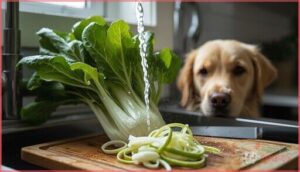This site is supported by our readers. We may earn a commission, at no cost to you, if you purchase through links.
Your dog’s pleading eyes track every bite you take, and when you’re chopping bok choy for dinner, you wonder if sharing a few leaves would be safe. This crisp Asian green has become a staple in health-conscious kitchens, packed with vitamins and minerals that benefit humans—but dogs process foods differently than we do.
Some vegetables that boost our health can trigger digestive issues or worse in our four-legged companions. Bok choy falls into a category of foods that requires thoughtful consideration before tossing pieces into your pup’s bowl. The answer isn’t a simple yes or no, but understanding the proper preparation, portion sizes, and potential risks can help you make an informed decision about whether this leafy green deserves a spot in your dog’s diet.
Table Of Contents
- Key Takeaways
- Can Dogs Eat Bok Choy?
- Nutritional Benefits of Bok Choy for Dogs
- Potential Risks of Feeding Dogs Bok Choy
- How to Safely Prepare Bok Choy for Dogs
- When to Avoid Giving Bok Choy to Dogs
- Tips for Adding Bok Choy to a Dog’s Diet
- Frequently Asked Questions (FAQs)
- What vegetables should a dog not eat?
- Are there any leafy greens dogs can’t eat?
- Is Chinese cabbage safe for dogs?
- What leafy greens are safe for dogs?
- How does bok choy interact with dog medications and supplements?
- Can dogs develop an allergy to bok choy over time?
- Can puppies eat bok choy safely?
- Does bok choy help with dog weight loss?
- Can bok choy cause bladder stones in dogs?
- Is organic bok choy better for dogs?
- Conclusion
Key Takeaways
- Bok choy is safe for dogs when served plain (no seasonings, garlic, or onions), with portions limited to 10% of daily calories—starting with one small leaf for medium dogs and adjusting by size.
- Both leaves and stems are edible, but steaming or boiling makes digestion easier than raw feeding, and all pieces should be chopped small to prevent choking on the tough white stalks.
- Dogs with thyroid conditions or hypothyroidism should avoid bok choy entirely because cruciferous vegetables can interfere with thyroid function and worsen hormone imbalances.
- Watch for allergic reactions (itching, hives, swelling) or digestive upset (gas, vomiting, diarrhea) within 24 hours of feeding, and consult your veterinarian before introducing bok choy if your dog has sensitivities or takes medications.
Can Dogs Eat Bok Choy?
Yes, dogs can eat bok choy, and it’s generally safe when prepared properly. This leafy green vegetable offers nutritional benefits, but there are some important guidelines to follow before adding it to your dog’s bowl.
If your dog has a sensitive stomach, you might also explore whether beans like kidney beans are safe alternatives to leafy greens.
Let’s look at what you need to know about safety, portions, and which parts of bok choy are best for your furry friend.
Is Bok Choy Safe for Dogs?
Bok choy is generally safe for dogs when you serve it plain, without sauces, onions, garlic, or salt. This crunchy green offers canine health benefits, but dog dietary safety depends on proper preparation and moderation.
- No bok choy toxicity concerns: Plain bok choy won’t harm most healthy dogs.
- Follow safe feeding guidelines: Start small to test tolerance.
- Ask for veterinarian advice: Dogs with thyroid issues need extra caution. For details on the importance of proper canine nutrition and feeding, consult trusted sources.
How Much Bok Choy Can Dogs Eat?
Knowing bok choy is safe, you’ll want clear feeding guidelines to protect your canine companions. Daily bok choy limits matter—treats should stay under 10 percent of your dog’s calories. Start with one small leaf for a medium dog, a teaspoon for small breeds, and up to two tablespoons for large pups.
Moderation prevents digestive upset, so ask your veterinarian about safe serving sizes suited to your dog diet and canine nutrition needs. To better understand bok choy’s rich, review guidance from trusted pet nutrition resources.
| Dog Size | Starting Portion | Maximum Per Serving |
|---|---|---|
| Small | 1 teaspoon | 1 teaspoon |
| Medium | 1 small leaf | 1–2 leaves |
| Large | 1 tablespoon | 2 tablespoons |
| Giant | 1–2 tablespoons | 2–3 tablespoons |
Which Parts of Bok Choy Are Edible for Dogs?
Once you’ve nailed the right portion, you need to know which parts of bok choy your canine companions can actually eat. Both the nutrient-rich leafy greens and the edible stems are safe, though the white stalks are tougher and require finer chopping.
Raw feeding is possible in tiny amounts, but proper bok choy prep—steaming or boiling without seasonings—makes digestion easier and promotes overall digestive health.
Nutritional Benefits of Bok Choy for Dogs
Bok choy isn’t just a crunchy addition to your dog’s bowl—it’s packed with essential vitamins and immune-boosting antioxidants that can support their overall health when served properly.
From essential vitamins to immune-boosting antioxidants, this leafy green offers several benefits worth knowing about.
If you notice white specks in your dog’s poop, it could signal incomplete digestion of nutrients like these greens.
Let’s break down what makes bok choy a nutritious option for your pup.
Key Vitamins and Minerals
Think of bok choy as a nutrient-dense powerhouse packed with essential vitamins and minerals your dog needs. This leafy green delivers vitamin A for sharp vision, vitamin C to strengthen immune defenses, and vitamin K for proper blood clotting.
Bok choy delivers essential vitamins A, C, and K that support your dog’s vision, immunity, and blood clotting
You’ll also find calcium supporting strong bones, plus iron, magnesium, potassium, and phosphorus working together to maintain ideal health optimization and nutrient balance.
Antioxidants and Immune Support
Your dog’s immune system gets a real boost from bok choy’s antioxidant arsenal. The vitamin C and carotenoids in this veggie neutralize free radicals, reducing oxidative stress that can weaken immunity.
Here’s how these phytonutrients support your pup’s defenses:
- Vitamin C enhances neutrophil function for frontline protection
- Vitamin A maintains mucous membranes guarding against infections
- Flavonoids modulate inflammatory responses during illness
- Glucosinolates break down into compounds protecting immune cells
Fiber and Digestive Health
Beyond vitamins, bok choy‘s fiber content plays a starring role in your dog’s digestive health. The insoluble fiber adds bulk to stool and speeds transit through the colon, preventing constipation and promoting regular bowel movements.
As a prebiotic, it feeds beneficial gut bacteria, supporting microbiome balance and producing short-chain fatty acids that nourish colon cells and improve overall canine digestive health.
Potential Risks of Feeding Dogs Bok Choy
While bok choy offers some nutritional perks, it’s not without a few bumps in the road for your dog. Like any new food, there are certain risks you’ll want to keep on your radar before tossing those leafy greens into your pup’s bowl.
Let’s walk through the main concerns so you can make an informed choice.
Digestive Upset and Gas
Just like you might feel bloated after a big salad, your dog can experience digestive upset when bok choy introduces too much fiber too quickly.
Gas relief becomes necessary as gut bacteria ferment these leafy greens, sometimes causing stomach upset and gastrointestinal issues.
Moderation protects digestive health—start with tiny portions to let your pup’s system adjust and maintain ideal gut health.
Choking Hazards
You mightn’t think twice about tossing leafy greens into your dog’s bowl, but bok choy‘s thick white stalks can create serious airway blockage if not prepared correctly.
Food hazards multiply when swallowing dangers aren’t addressed through safe preparation of dog food:
- Cut stalks into small, bite-sized pieces to minimize choking risks
- Remove tough stems that resist chewing
- Monitor small breeds closely during meals
- Steam stalks to soften digestive obstacles
Preventing choking hazards in dogs starts with thoughtful food safety precautions.
Allergic Reactions and Sensitivities
Although rare, food allergies can develop when your dog’s immune system mistakes bok choy proteins as threats. Watch for sensitivity signs like itching, hives, or digestive upset after introducing this vegetable.
If allergic reactions occur, allergy testing helps identify specific triggers, enabling better hypersensitivity management. Managing dog food allergies requires strict avoidance, while reaction prevention starts with gradual introduction and close monitoring.
How to Safely Prepare Bok Choy for Dogs
The key to making bok choy safe for your dog comes down to proper preparation. How you wash, cut, and cook this leafy green can make the difference between a healthy snack and a potential problem.
Let’s walk through the essential steps to get it right.
Washing and Cutting Techniques
Proper washing and cutting are your first line of defense against digestive upset. Rinse bok choy under cold water for 20 to 30 seconds, separating the leaves and core to dislodge hidden grit.
Then cut stalks and leaves into small, uniform pieces—about half-inch ribbons—to prevent choking hazards. This leafy green prep keeps vegetable safety front and center, ensuring your dog can enjoy this treat in moderation.
Raw Vs. Cooked Bok Choy
You’ve washed and chopped your bok choy—now decide whether to serve it raw or cooked. Raw bok choy retains more vitamin C and crunch, but lightly steamed leaves improve nutrient bioavailability of carotenoids while easing digestion.
Cooking methods matter: gentle steaming beats boiling, which leaches minerals. Both options fit canine nutrition, so match your choice to your dog’s digestive health.
- Raw feeding preserves water-soluble vitamins intact
- Cooked bok choy softens stalks for easier chewing
- Steaming increases vitamin A activity from beta-carotene
- Raw forms may trigger gas in sensitive dogs
- Nutrient retention stays highest with light cooking or none at all
Avoiding Harmful Additives
Clean bok choy never needs seasonings, oils and seasonings, or sauces—all can introduce toxic ingredients your dog shouldn’t ingest. Salt, garlic, and onion are outright toxic, while artificial preservatives like BHA or sodium benzoate may trigger digestive upset. Stick with additive-free foods: plain steamed or raw leaves without flavor enhancers. Safe preparation means skipping the butter and sticking to natural preservatives found in whole, unprocessed vegetables.
Healthy alternatives keep tails wagging safely.
| Additive to Avoid | Why It’s Risky |
|---|---|
| Garlic and onion | Toxic to red blood cells |
| Artificial colors (E102) | Hypersensitivity reactions |
| BHA/BHT preservatives | Potential health concerns |
| Salt and sodium nitrite | Vomiting, weakness |
| Hydrogenated oils | Pancreatitis risk |
When to Avoid Giving Bok Choy to Dogs
While bok choy can be a healthy addition to many dogs’ diets, it’s not the right fit for every pup. Some dogs have conditions or sensitivities that make this leafy green a poor choice, and knowing when to skip it can save you and your dog from unnecessary trouble.
Let’s look at situations where you’ll want to keep bok choy off the menu.
Dogs With Sensitive Stomachs
If your dog has digestive issues or food sensitivities, you’ll want to tread carefully with bok choy. Dogs with sensitive stomachs often struggle with new vegetables, leading to gas, bloating, or loose stools even in small amounts.
Stick to a gentle feeding approach—introduce tiny portions only after consulting your veterinarian, and watch closely for signs of stomach upset before continuing.
Dogs With Thyroid or Health Conditions
Bok choy and similar cruciferous vegetables can interfere with thyroid function in dogs, especially those with hypothyroidism or other thyroid concerns. If your dog takes thyroid medication or has a history of thyroid health issues, skip this veggie altogether—it may worsen hormone imbalances.
Always check with your veterinary care provider before introducing bok choy to confirm it fits your dog’s canine health needs.
Signs of Adverse Reactions
Vigilance is key after introducing any new food. Watch for allergic responses like sudden itching, hives, or facial swelling—these require emergency care.
Vomiting, diarrhea, or persistent gas signal digestive issues or upset stomach. Wheezing or lethargy demand immediate veterinary attention.
Canine symptoms appearing within 24 hours often indicate toxic reactions or sensitivities. Reaction prevention starts with small portions and close monitoring.
Tips for Adding Bok Choy to a Dog’s Diet
If you’ve decided bok choy is right for your dog, you’ll want to know the best way to serve it. The key is starting small, keeping portions appropriate, and making sure it complements rather than replaces your dog’s regular meals.
Here are some practical tips to help you introduce this veggie safely and effectively.
Serving Suggestions and Portion Control
In terms of portion control, think of bok choy as a treat within your dog’s daily feeding plan—not the main event. Start with one or two tablespoons for smaller dogs, up to a quarter cup for larger breeds, to guarantee safe serving sizes while maintaining nutrient balance.
This moderation helps you access nutritional benefits without overwhelming your pup’s digestive system or disrupting meal planning.
Mixing Bok Choy With Regular Dog Food
When you’re ready to blend this leafy green into your pup’s regular meals, the process is simpler than you might think. You can add small amounts of chopped bok choy to kibble or homemade dog food to boost bok choy nutrition without disrupting your meal planning routine.
- Start with 1-2 small chopped leaves mixed into your medium-sized dog’s food to test tolerance before increasing portions.
- Wash thoroughly under running water to remove dirt and residues, then dry well to prevent excess moisture from affecting meal texture.
- Chop into bite-sized pieces to minimize choking risk when serving alongside your dog’s regular diet.
- Skip salt, garlic, and seasonings which can harm dogs—fresh, plain bok choy works best as a canine supplement.
For most dogs, a half cup of chopped bok choy mixed with regular food provides healthy treats without overloading daily calories. Adjust your pup’s overall intake to maintain a balanced diet, and limit additions to two servings weekly if weight control matters.
Consulting a Veterinarian for Guidance
Before you toss that first piece of bok choy into your dog’s bowl, a quick veterinary advice session can save you worry down the road.
Your vet consultation helps tailor pet nutrition to your pup’s specific needs, catching potential issues with medications or thyroid conditions early. They’ll guide safe portions for canine wellness and monitor how your dog reacts to this new addition.
Frequently Asked Questions (FAQs)
What vegetables should a dog not eat?
Onions, garlic, chives, and leeks top the list of toxic veggies—they damage red blood cells and trigger anemia.
Rhubarb leaves, green tomato parts, and wild mushrooms also pose serious poisoning risks for dogs.
Are there any leafy greens dogs can’t eat?
Yes, certain leafy greens pose risks. Rhubarb leaves contain toxic oxalates causing kidney damage, while spinach and kale may stress kidneys or trigger digestive issues.
Always consult your veterinarian about safe leafy green alternatives.
Is Chinese cabbage safe for dogs?
Chinese cabbage—better known as bok choy—is absolutely safe for dogs when you prepare it properly.
This crunchy, nutrient-packed vegetable offers vitamins A, C, and K that support canine health, immune function, and bone strength beautifully.
What leafy greens are safe for dogs?
Many leafy greens support dog nutrition and pet safety, including spinach, kale, and romaine lettuce.
These vegetables for dogs offer vegetable benefits when served plain, promoting canine health alongside other safe leafy green veggie options.
How does bok choy interact with dog medications and supplements?
In the context of mixing greens with meds, bok choy is mostly a safe bet.
While calcium in it may slow antibiotic absorption and vitamin K can affect blood thinners, standard portions rarely cause medication interactions or supplement risks.
Can dogs develop an allergy to bok choy over time?
Dogs can develop food allergies to bok choy after repeated exposure, even if they tolerated it initially.
Watch for itching, digestive upset, or skin reactions—signs your dog’s immune response has shifted over time.
Can puppies eat bok choy safely?
Like introducing a new friend to your young dog, bok choy can join a puppy’s diet in small, carefully prepared portions.
Start with finely chopped, steamed pieces after consulting your veterinarian about safe feeding practices.
Does bok choy help with dog weight loss?
Bok choy aids weight management by adding nutrient-dense bulk with only nine calories per cup, helping your dog feel satisfied without extra pounds.
However, overall calorie reduction and portion control across their balanced diet drive real weight loss.
Can bok choy cause bladder stones in dogs?
While it’s not a smoking gun, bok choy contains oxalates that may contribute to stone formation in susceptible dogs.
Urinary health depends on mineral balance and kidney function, so veterinary guidance on canine dietary guidelines matters most.
Is organic bok choy better for dogs?
You don’t need to buy organic bok choy for your dog. What matters more is washing thoroughly and preparing it plain—without seasonings—since proper handling beats organic status for dog nutrition and vegetable safety.
Conclusion
Studies show that over 90% of dog owners admit to sharing human food with their pets, yet many don’t research safety first. You now understand that dogs can eat bok choy in moderation when properly prepared, but individual health factors matter.
Before adding this nutrient-rich green to your pup’s bowl, consider their digestive sensitivities and existing conditions. When in doubt, your veterinarian remains your best resource for tailored dietary guidance that keeps your companion healthy and thriving.
- https://pangovet.com/talk-to-a-vet-online-dog-ate-drank-something/?utm_source=dogster&utm_medium=article&utm_campaign=dog_eat_drink&utm_content=can-dogs-eat-bok-choy
- https://privacy.masterclass.com/
- https://www.nutrition-and-you.com/bok-choy.html
- https://www.masterclass.com/articles/can-dogs-eat-bok-choy
- https://mypetnutritionist.com/post/the-ultimate-natural-guide-for-thyroid-disease-in-pets/















